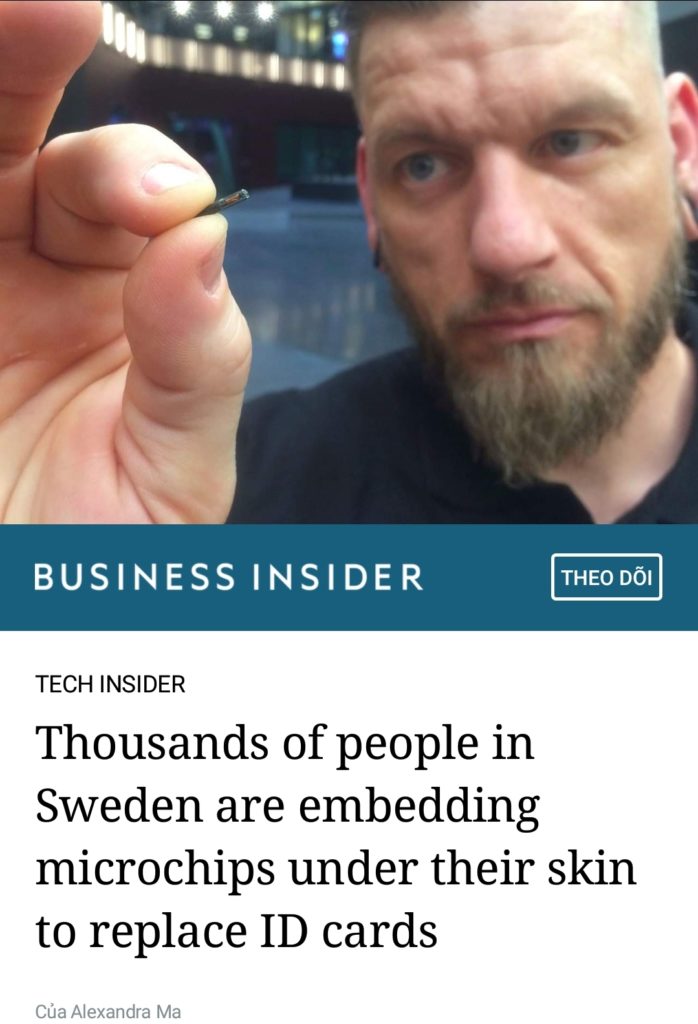Source: BBC

Thousands of Swedes are having microchips implanted (cấy ghép) into their bodies so that they don’t need to carry key cards, IDs, and even train tickets.
About 3,000 people in Sweden have inserted a microchip – which is as tiny as a grain of rice (1 hạt gạo) – under their skin over the past three years, Agence France-Presse reported. The technology was first used in the country in 2015.
The implants have already helped replace the need for a host of daily necessities. Ulrika Celsing’s microchip, which is in her hand, has replaced her gym card and office key card. When she enters her workplace, the 28-year-old simply waves her hand near a small box and types in a code before the doors open, AFP said.
Last year, the state-owned SJ rail line started scanning the hands of passengers with biometric chips (chip sinh trắc, những đặc điểm sinh học khác biệt của mỗi người như dấu vân tay, gene) to collect their train fare while on board.
There is no technological reason the chips couldn’t also be used to buy things just like a contactless credit card, but nobody appears to have started testing that yet.
‘A slight sting’ (1 cú chích nhói nhẹ)
The procedure is similar to that of a piercing (chọc thủng qua – thường để đeo trang sức kim loại trên tai, chân mày, trên lưỡi, rốn…) and involves a syringe (xy ranh, ống tiêm) injecting the chip into the person’s hand. Celsing, who obtained her injection at a work event, told AFP she felt just a slight sting.
But the chip implants could cause infections or reactions in the body’s immune system, Ben Libberton, a microbiologist at MAX IV Laboratory in southern Sweden, told AFP.
This clip from 2015 shows a microchip being inserted into a person’s hand:
The rise of ‘biohacking’
Biohacking – the modification of bodies with technology – is on the rise as more and more people start using tech wearables (thiết bị đeo trên người) such as Apple Watches and Fitits.
About four years ago, Swedish biohacking (hack sinh trắc) group Bionyfiken started organising “implant parties” – where groups of people insert chips into their hands en masse (toàn thể) – in countries including the US, UK, France, Germany, and Mexico.
Some 50 employees at Wisconsin vending-machine (máy bán hàng tự động) company Three Square Market voluntarily agreed to insert microchips into their hands, which they could then use to buy snacks, log in to computers, or use the photocopier.

Swedes seem more willing to try the technology than most other nations.
The country’s 10 million-strong population is generally more willing to share personal details, which are already recorded by the country’s social-security system and readily available. According to AFP, people can find each others’ salaries by simply calling public tax authorities.
Many of them also don’t believe the microchip technology is advanced enough to be hacked. Libberton, the microbiologist, also said the data collected and shared by implants are too limited for users to fear hacking or surveillance. (theo dõi – ở đây là sợ bị theo dõi)
Bionyfiken founder Hannes Sjöblad told Tech Insider in 2015:
“The human body is the next big platform. The connected body is already a phenomena. And this implant is just a part of it. […]
“We are updating our bodies with technology on a large scale already with wearables. But all of the wearables we wear today will be implantable in five to 10 years.

One of the world’s biggest aluminium (nhôm) producers has switched to manual operations at some smelting plants (nhà máy luyện quặng) following a “severe” ransomware attack. (sự tấn công bằng phần mềm gián điệp)
Hydro, which employs more than 35,000 people in 40 countries, says the attack began on Monday night and is ongoing. (đang diễn ra)
Some of the company’s factories have been forced to halt production though other facilities, including its power plants, are functioning normally
The firm’s website is down but updates are being posted to Facebook.
US factories were among those affected, as were smelting plants in Norway.
Notices have been posted at the entrances to some of Hydro’s offices telling employees not to log in to their computers.
Staff worldwide are instead using mobile phones and tablets to access their emails, according to Hydro’s chief financial officer Eivind Kallevik.
At some factories, workers are using printed order lists while they remain unable to retrieve (lấy ra – từ trong trí nhớ, trong kho lưu trữ…) order data from their computers.
Norwegian security authorities said they were investigating the possibility that the cyber-attack was caused by a relatively new form of ransomware known as LockerGoga. However, they added it was not yet clear that this was the case.
A spokesman for Hydro also told the BBC that he could not yet confirm who was behind the attack.
He added that digital systems at Hydro’s main smelting plants were programmed to ensure machinery worked efficiently.
However, these systems had had to be turned off at some of the facilities.
“They are much more reliant today on computerised systems than they were some years ago,” a spokesman (người phát ngôn của tổ chức) said.
“But they have the option of reverting back to methods that are not as computerised, so we are able to continue production.”
Work was also stopped at some metal extrusion plants, (nhà máy đùn kim loại) where aluminium is processed into products such as building facades. (/fəˈsɑːdz/ mặt tiền tòa nhà)
Relying on back-ups
The firm said it was working to contain and “neutralise” the attack and added that it had not caused any safety-related incidents.
It added that it had data backups ready with which to restore systems once the virus had been dealt with.
Norway’s state cyber-security (an ninh mạng) agency is helping Hydro to respond to the incident.
Cyber-security expert Kevin Beaumont told the BBC that if the LockerGoga ransomware had been used, it would likely have been deployed (triển khai) to Hydro’s systems manually by an attacker. (nghĩa là có người đem phần mềm gián điệp vào công ty và tự tay cài lên máy chủ của công ty)
This could have been done by someone who had gained administrator access to those systems. (thủ phạm có quyền truy cập của người quản lý hệ thống máy tính – thường là sếp của phòng IT hoặc các giám đốc/CEO mới có quyền này)
“For an industrial manufacturing business this is potentially bad news, as it may have spread across their company, including near industrial control systems,” added Mr Beaumont.
